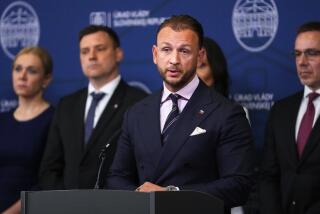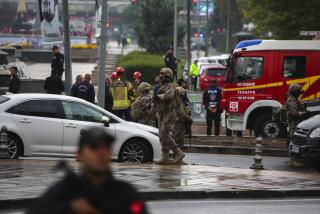Member of Iraqi Council Attacked
- Share via
BAGHDAD — A member of Iraq’s Governing Council was seriously wounded Saturday when at least five men with automatic rifles ambushed her car, in the first assassination attempt on an Iraqi serving in the U.S.-backed interim government.
The brazen morning assault on Aqila Hashimi, one of three women on the 25-person council, dealt a fresh blow to U.S. efforts to build a new political order here and came after some members complained that they were in danger of assassination from elements labeling Iraqis who work with the Americans as collaborators.
The ambush, which seriously wounded Hashimi’s driver and injured her brother Zaid, who was acting as her bodyguard, also raised anew questions about the extent of U.S. control five months after its forces occupied Iraq.
No one claimed responsibility for the attack on the veteran diplomatic worker, a Shiite who was the only Iraqi Governing Council member to have served in ousted President Saddam Hussein’s administration.
But suspicion immediately fell on die-hard remnants of the regime and on religious militants and foreign fighters who violently reject the U.S. occupation of Iraq and target both foreign forces and Iraqis they call traitors.
Five to seven attackers waiting in a pickup truck opened fire on Hashimi’s two-car convoy a few hundred yards from her western Baghdad home as she was leaving for her office, witnesses said.
She had been scheduled to depart later in the day for the United States, as part of Iraq’s delegation to this week’s session of the U.N. General Assembly.
The U.S.-led occupation authority acknowledged more than a month ago that council members faced “great personal risk.” Ahmad Chalabi, who holds the council’s rotating presidency, issued a statement Saturday noting that Hashimi “was threatened repeatedly” but chose to continue as a Governing Council member.
“The members of the Governing Council and ministers will not be intimidated by the terrorists,” Chalabi said. “They will continue to do their patriotic duty to move Iraq toward freedom, democracy and sovereignty.”
Attacks by insurgents have taken a mounting toll on U.S. forces here. In addition, a series of four large bombings in August killed more than 100 people, including the country’s main Shiite political leader, the Ayatollah Mohammed Bakr Hakim, and the chief U.N. envoy to Iraq, Sergio Vieira de Mello.
Hashimi had eschewed a heavy contingent of bodyguards from outside her family, relatives said.
“God will protect me,” one of her brothers, Aqil, quoted her as having told him the night before the attack.
Speaking Saturday evening after returning from her bedside, Aqil said his sister was pulling through courageously from at least two bullet wounds to the abdomen and another in the leg.
“She is talking,” he said. “She is breathing normally.”
The first thing she asked about after she regained consciousness was the condition of her driver, identified only as Sufa, and her brothers Zaid and Taib, who had been with her, he said.
A tall, white-haired man who looked drawn and weary from the day’s experience, Aqil Hashimi recounted his Friday night conversation with his sister.
“I told her, ‘Your bodyguards aren’t so good, and there are very few of them,’ ” he said. “She was saying, ‘God will protect me.’ ”
Hashimi was saved when her driver managed to swerve past the first car in her entourage and the attackers, getting away at high speed and ultimately plowing the white Land Cruiser into a home. The attackers started to pursue her but turned away in the face of gunfire from Zaid Hashimi and from security guards at an adjacent school who came to the rescue, witnesses said.
Hashimi was rushed to an Iraqi hospital where officials said she underwent surgery. She was transferred in a convoy of U.S. armored vehicles and military ambulances to the U.S.-run Ibn Sina Hospital, near a former presidential palace.
Several staff members at Baghdad’s Al Yarmouk Hospital said Hashimi was conscious and speaking when she arrived, but bleeding heavily. “She has at least one bullet in her abdomen and some other injuries,” Dr. Ali Abdul Muhsin said. “Several organs were injured -- her intestines, her liver.”
Aqil said she was scheduled to undergo a second operation early today, and he said doctors seemed optimistic about her prognosis. The second surgery would explore the area around her pancreas to assess damage and possibly to remove a bullet or fragments still lodged there, he said. In addition to wounds to her abdomen, she had a bullet wound to the leg, he said.
The driver suffered bullet wounds to his back, said neighbors who helped the victims after the attack, and Zaid was also reported injured, although the extent of his wounds was not clear.
“This senseless attack is not just against the person of Aqila Hashimi,” said L. Paul Bremer III, the U.S. civilian administrator in Iraq. “It is an attack against the people of Iraq and against the common goals we share for the establishment of a fully democratic government.”
After the Governing Council was formed in early July, reports circulated that Hussein supposedly offered a bounty of $25,000 to anyone who killed a council member.
Although she once worked closely in the Foreign Ministry with Tarik Aziz, the former foreign minister and deputy prime minister of Iraq, Hashimi was a technocrat and not a pro-Hussein partisan, said her cousin Medhi Hashimi.
“She was never a Baathist. She was an Iraqi citizen,” he said with evident pride as he stood in front of her house. A coterie of grim-faced relatives cradled automatic rifles in their arms and looked over visitors suspiciously.
He also described her as a congenitally moderate person, and modest. One reason she rejected more bodyguards, he said, was that she did not want all the fuss of a big entourage going with her all the time. She felt safer and more comfortable with her brothers, with whom she lived.
“Maybe it is one of the reasons why it was easy for them to make such an attempt on her life,” he said.
Abdul Wahab Qasab, a political analyst at the University of Baghdad, said the ongoing security vacuum in Iraq was the main reason behind the assassination attempt.
Opponents of the U.S. occupation authority “have the initiative,” he said. “They can do whatever they like.”
He also saw Hashimi as the council’s most obvious target for assassination by militants, “because she is a woman and because of her ties to the former regime.”
Hamid Majid Moussa, a Governing Council member from the Iraqi Communist Party, agreed that Hashimi’s ties to the old regime might have made her more of a target for loyalists, because Baathists whose hands are not “stained with blood” might be encouraged by her example to cooperate with the Americans.
Security measures inside the council’s compound had been beefed up, “but outside it’s up to the individual council members,” said Safeen Dizayee, a Kurdish Democratic Party aide who regularly attends the meetings of the Governing Council. “Most of the members have their own security. The coalition is providing only a vehicle and some security to those who request it.”
The attempt took place in the Al Jihad section of Baghdad, not far from the international airport, where the Hashimi family has lived since the 1980s.
It was the first workday of the Muslim week. Her car, with her driver and Zaid, followed another car carrying Taib.
According to one witness, after they had rounded a corner into a street about half a block from her house, both cars were sprayed with fire from Kalashnikov rifles and attacked by either a rocket-propelled grenade or a hand grenade. The grenade missed the cars and exploded by the side of the street.
Hassan Hussein, who was guarding a school nearby, heard the shooting and rushed to Hashimi’s street, he said. He saw gunfire coming from a white pickup truck and took aim at it. He ended up with a bullet wound to his hand.
Hashimi’s injured driver got past the attackers and Taib’s car and careened around the corner. The vehicle swerved and fishtailed for about 300 yards before punching through a wall across an intersection at the end of the street, smashing a parked car in the driveway of a home and shoving it against the back wall of a garage, said Arkan Umar Salih, the homeowner.
Muhder Mohaned, a 21-year-old law student, and his brother Mandouh, 22, were sleeping when they were awakened by an explosion, followed immediately by heavy gunfire. Their mother pleaded with them to stay in, but after a few minutes they went outside to investigate, he said.
Muhder said they could still see the smoke and dust from an explosion on one side of their street and saw Hashimi’s brother Zaid standing on the other.
As they described it, Zaid was dazed, bleeding and firing his rifle in the direction of the initial attack while trying to make a call on a satellite phone.
Muhder and Mandouh said they walked down the street toward their neighbor, announcing their names and raising their arms in a gesture that he should calm himself and stop shooting.
When the pair reached Zaid, they saw the driver and Hashimi in the car, both wounded. They and other neighbors used a shovel to pry open the jammed door, he said.
They lifted Hashimi from the car as her legs collapsed beneath her, and put her in a passing car, whose driver quickly drove her to a hospital.
Firas Shamsaddin Ismail, another school security guard, said he had joined Zaid in firing at the attackers.
“I don’t know if we were able to hit any of the gunmen,” Ismail said. “I was shooting at the pickup, and after it left, I saw two more cars following it.... It was an organized and well-planned attack.”
Times staff writer Alissa Rubin contributed to this report.
More to Read
Sign up for Essential California
The most important California stories and recommendations in your inbox every morning.
You may occasionally receive promotional content from the Los Angeles Times.













